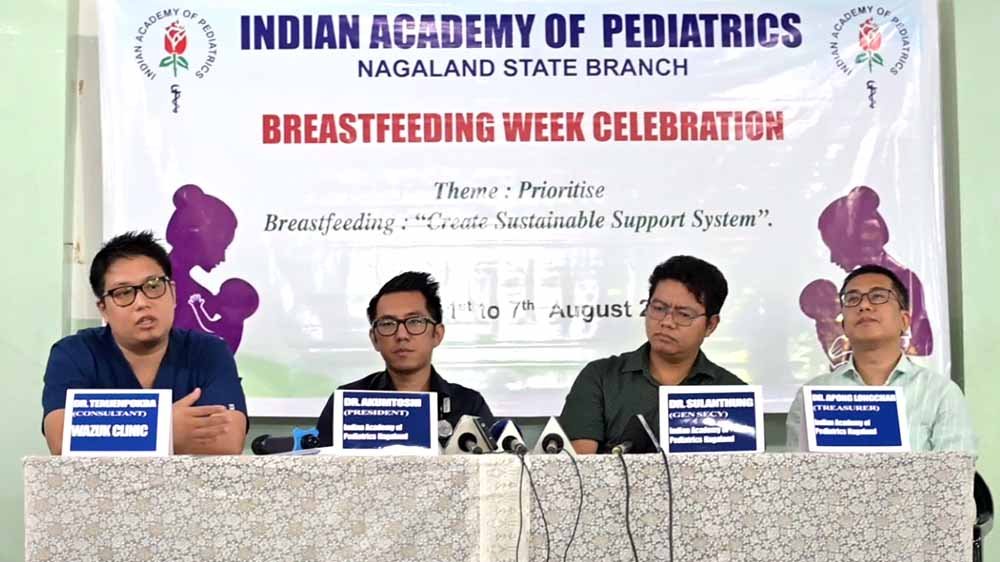The Nagaland Chapter of the Indian Academy of Pediatrics (IAP) has emphasized the urgent need for designated private spaces for breastfeeding mothers in public areas such as airports, railway stations, transportation hubs and offices. This call was made during a press conference held on Thursday at the conference hall of Zion Hospital, Dimapur, as part of the observance of World Breastfeeding Week (August 1–7).
Addressing the media, IAP Nagaland president Dr. Akumtoshi highlighted the importance of creating awareness and building long-lasting structures that make breastfeeding accessible and practical for all mothers. “While many hospitals in Nagaland already provide breastfeeding spaces, it is encouraging to see churches beginning to do the same,” he noted.
This year, World Breastfeeding Week is being observed under the theme “Prioritise Breastfeeding: Create Sustainable Support”. The press conference was attended by IAP general secretary Dr. Sulanthung, treasurer Dr. Apong Longchar, and Dr. Temjenpokba Longkumer, a pediatrician at Wazuk Clinic, along with Dr. Akumtoshi.
Dr. Akumtoshi stressed the need to support breastfeeding mothers instead of discouraging them. He referred to World Health Organization (WHO) guidelines recommending exclusive breastfeeding for the first six months and continued breastfeeding up to two years and beyond. He noted that breastmilk helps boost a child’s intelligence quotient and immunity, while also supporting the mother’s mental and physical health.
Speaking on the scientific significance of breastfeeding, Dr. Temjenpokba Longkumer stated that it is more than just nutrition. “Breastfeeding supports brain development, provides complete natural nutrition, strengthens immunity and reduces long-term health risks,” he said. He added that breast milk is uniquely tailored to each baby’s needs, both species- and baby-specific.
Dr. Apong Longchar elaborated on how the composition of breast milk changes during feeding with foremilk being rich in lactose and hindmilk being high in fats vital for brain development. He also noted the natural diurnal variations in milk composition, emphasizing its adaptability to a baby’s needs.
Addressing common misconceptions, Dr. Longchar clarified that colostrum – the thick, yellowish milk produced in the first few days post-delivery is vital despite its low volume. “Support is crucial, especially for first-time mothers, as breastfeeding doesn’t always come naturally,” he said, adding that continued breastfeeding remains beneficial even after the introduction of solid foods.
While formula milk can be a viable option in certain cases, he stressed that nothing is better than a mother’s own milk.
On the state of breastfeeding in Nagaland, Dr. Sulanthung acknowledged that although formal studies are lacking, pediatricians agree the state’s trends mirror national averages. He cited National Family Health Survey data indicating that only 54.9% of children in India receive exclusive breastfeeding for the first six months, and just 41.6% are breastfed within the first hour of birth — despite 79% of births occurring in institutions.
He attributed these gaps to misconceptions, lack of awareness among healthcare staff and insufficient privacy in delivery settings. “This is why this year’s theme rightly focuses on sustainable support,” he said.
The doctors also addressed concerns related to special conditions. For instance, mothers with serious illnesses such as cancer may require alternatives, while those on minor medications can often still breastfeed safely, pending medical advice. Importantly, they noted that HIV-positive mothers on antiretroviral therapy (ART) with undetectable viral loads can safely breastfeed — a point they emphasized alongside the importance of regular antenatal checkups.
Nagaland IAP calls for breastfeeding-friendly spaces
Staff ReporterDIMAPUR AUG 7 (NPN)

